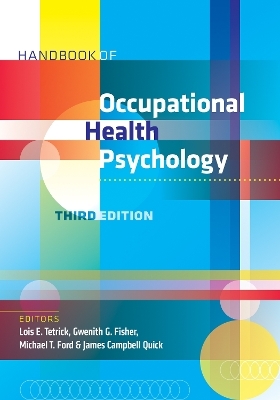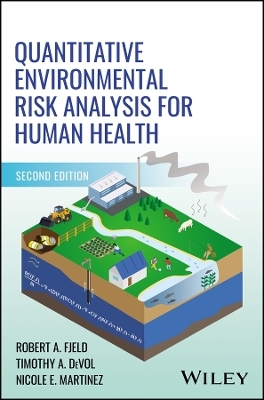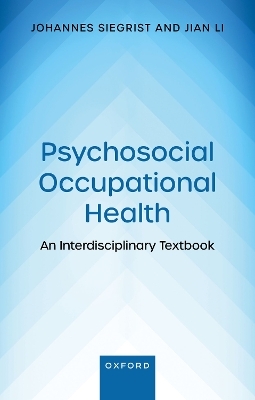
Handbook of Occupational Health Psychology
American Psychological Association (Verlag)
978-1-4338-3777-7 (ISBN)
This third edition offers 14 new chapters and a fully updated, comprehensive survey of the field of occupational health psychology, including its history, theories, models, interventions, and empirical research.
Grounded in the NIOSH Total Worker Health® model, this new edition on Occupational Health Psychology (OHP) reflects the expanding scope of the field, as well as recent changes in the nature and organization of work. It is an essential resource for professionals and scholars who seek to prioritize worker safety while promoting their health and well-being. OHP is informed by research from psychology subdisciplines including I/O, human factors, cognitive, social, health, clinical, counseling and developmental psychology, as well as public health, preventive medicine, occupational medicine, ergonomics, industrial hygiene, and industrial engineering.
Historically, OHP focused on preventing illness, injury, or distress of workers in their work environments. The field today has expanded to encompass more proactive, holistic approaches to worker well-being that also includes workers’ job and life satisfaction, positive emotional experiences, sense of meaningfulness, and social support and relationships. OHP has also become more interdisciplinary and global.
Lois E. Tetrick, PhD, is a fellow of the European Academy of Occupational Health Psychology, the American Psychological Association (APA), the Society for Industrial and Organizational Psychology (SIOP), and the Association for Psychological Science (APS). She has served as President of SIOP, the Chair of the Human Resources Division of the Academy of Management and has represented SIOP on the American Psychological Association (APA) Council of Representatives and the APA Board of Scientific Affairs. She is a former editor of the Journal of Occupational Health Psychology and a former Associate Editor of the Journal of Applied Psychology. Dr. Tetrick serves on the editorial boards of Journal of Organizational Behavior, Journal of Managerial Psychology, Journal of Applied Psychology and Management and Organization Review. Dr. Tetrick has edited several books including The Employment Relationship: Examining Psychological and Contextual Perspectives with Jackie Coyle-Shapiro, Lynn Shore, and Susan Taylor; The Employee-Organization Relations: Applications for the 21st Century with Lynn Shore and Jackie Coyle-Shapiro; Handbook of Occupational Health Psychology (1st and 2nd editions) with James C. Quick; Health and Safety in Organizations with David Hofmann; and Research Methods in Occupational Health Psychology: Measurement, Design and Data Analysis with Bob Sinclair and Mo Wang. In addition, she has published numerous chapters and journal articles on topics related to her research interests in occupational health and safety, occupational stress, the work-family interface, psychological contracts, social exchange theory and reciprocity, organizational commitment, and organizational change and development. A common underlying interest in all of her research and teaching is incorporating a global perspective in understanding employees’ experiences of the work environment. Gwenith G. Fisher, PhD, earned a B.A. in Psychology with a minor in Spanish at Penn State University. She completed her M.A. and Ph.D. in industrial/organizational (I/O) psychology at Bowling Green State University with a specialty in occupational health psychology and a minor in quantitative methods. From 2001 – 2013, she worked at the Survey Research Center of the University of Michigan Institute for Social Research in Ann Arbor, Michigan and taught in the M.A. program in I/O psychology at the University of Detroit Mercy. In 2013 Gwen moved west to Colorado State University (CSU), where she is currently a tenured Associate Professor of Psychology and Adjunct Associate Professor in the Department of Environmental and Occupational Health and Department of Epidemiology in the Colorado School of Public Health. Since 2014 Dr. Fisher has directed the CSU Occupational Health Psychology training program, funded by the NIOSH Mountain and Plains Education and Research Center. Dr. Fisher’s research focuses on quality of work life issues. Her research program spans interdisciplinary boundaries to investigate individual and work factors related to worker health, well-being and organizational outcomes. To date she has published 55 peer-reviewed articles and 16 book chapters. In 2015 she and her coauthors received the award for “Best Paper in the Journal of Occupational Health Psychology in 2013-2014” for their paper on mental job demands and cognitive functioning. Two other papers received editor commendations in the Journal of Business and Psychology in 2015 and 2019. Her research has been funded by NIH-NIA, NIOSH, and the Alfred P. Sloan Foundation. Dr. Fisher serves on the editorial boards of Journal of Occupational Health Psychology, Occupational Health Science, Work, Aging, and Retirement, and Journal of Business and Psychology. Additionally, she directs the pilot projects program and serves on the internal steering committee of the Center for Health, Work, and Environment, a NIOSH Center of Excellent in Total Worker Health. Dr. Fisher has been very involved with the Society for Occupational Health Psychology for many years, as Member at Large (2015-2019), and is currently President-Elect and will serve as President in 2022-2023. Michael T. Ford, PhD, received his Ph.D. in 2008 in industrial-organizational psychology from George Mason University. He has been an associate professor of management at the University of Alabama since 2017. Prior to that, he was as an Assistant and Associate Professor of Industrial-Organizational Psychology at the University at Albany, SUNY from 2008 through 2017. Dr. Ford currently is an associate editor for Occupational Health Science and is on the editorial boards for Journal of Occupational Health Psychology, Journal of Applied Psychology, and Group & Organization Management. He previously was as an associate editor for Journal of Vocational Behavior. Dr. Ford also served on the APA/NIOSH Work, Stress, and Health conference planning committee and was a member-at-large on the Society for Occupational Health Psychology executive committee. His research focuses on worker health, safety, and well-being, the work-family interface, and the employee-organization relationship. James Campbell Quick, PhD, is Distinguished University Professor & Professor Emeritus, the University of Texas at Arlington, and Colonel, United States Air Force (Ret.) whose senior awards were the Legion of Merit and the Meritorious Service Medal. Colonel Quick served on the Defense Health Board (2008-2011) by appointment of SECDEF Robert Gates and was a member of the Society of Air Force Clinical Psychologists. Colonel Quick is a fellow of APA, SIOP, and the Society of Antiquaries of Scotland (FSAScot). He was awarded the 2002 Harry and Miriam Levinson Award by the American Psychological Foundation. He and his brother Jonathan’s signature work is the theory of preventive stress management (TPSM), the term preventive stress management included in the APA Dictionary of Psychology. Colonel Quick has more than 130 publications in 10 languages and over 15,000 scholarly citations. He was elected to the UT Arlington Academy of Distinguished Scholars in 2013 and won a UT System 2016 Regents Outstanding Teaching Award. Colonel Quick was honored with the Maroon Citation by Colgate University. He is a member of the Chancellor’s Council and the Ashbel Smith Circle of the University of Texas System and the Silver Society, American Psychological Foundation.
Part I. Mission and History
Chapter 1. Introduction: Public Health and Prevention in Occupational Settings
Lois E. Tetrick, Gwenith G. Fisher, Michael T. Ford, and James Campbell Quick
Chapter 2. The Origins of Occupational Health Psychology: Another Look
Joseph J. Hurrell Jr. and Steven L. Sauter
Part II. Models and Frameworks
Chapter 3. Examining the Dynamics of Major Theories of Occupational Stress
Pamela L. Perrewé and Charn P. McAllister
Chapter 4. The Holistic Model of Stress: Savoring Eustress While Coping With Distress
Bret L. Simmons, Alexis Hanna, and Jinyu Hu
Chapter 5. Controlling Occupational Safety and Health Hazards
Michael J. Smith, Pascale Carayon, and Peter Hoonakker
Chapter 6. An Integrated Framework for Organizational Well-Being: Updated Themes, Potential Competencies, and a Broader Horizon
Joel Bennett, Cristina Banks, and Aldrich Chan
Chapter 7. A Dual Process Model of Multidimensional Work–Nonwork Balance
Wendy J. Casper, Shelia A. Hyde, Hoda Vaziri, and Julie H. Wayne
Chapter 8. Cross-Cultural Occupational Health Psychology: An Updated Review
William Scott, Chu-Hsiang Chang, and Paul E. Spector
Part III. Causes and Risks
Chapter 9. Organizational Climate and Occupational Health
Mark G. Ehrhart and Maribeth Kuenzi
Chapter 10. Nonstandard Work Schedules
Philip Tucker and Göran Kecklund
Chapter 11. Nonstandard Work Arrangements
Regina Pana-Cryan, John Howard, and Tim Bushnell
Chapter 12. Sleep and Fatigue in Occupational Health Psychology Research
Larissa K. Barber and Christopher J. Budnick
Chapter 13. Taking a Broader View of Justice as a Component of Occupational Health: Moving Beyond Organizational Justice
M. Blake Hargrove
Chapter 14. Mistreatment in Organizations: Where Are We, and Where Are We Going
Liu-Qin Yang, Stefanie Fox, and Katharine McMahon
Part IV. Symptoms, Disorders, and Consequences
Chapter 15. Job Burnout
Michael P. Leiter and Christina Maslach
Chapter 16. Occupational Psychosocial Factors and Cardiovascular Disease
Paul Landsbergis, Javier Garcia-Rivas, Arturo Juarez-Garcia, BongKyoo Choi, Marnie Dobson Zimmerman, Viviola Gomez Ortiz, Niklas Krause, Jian Li, and Peter Schnall
Chapter 17. Pain, Musculoskeletal Injuries, and Return to Work
William S. Shaw, Alicia G. Dugan, and Jennifer Garza
Chapter 18. Alcohol and Illicit Drug Involvement in the Workforce and Workplace
Michael R. Frone and Peter A. Bamberger
Chapter 19. Psychological Well-Being and Occupational Health: Caught in the Quicksand or Standing on a Firm Foundation?
Robert R. Sinclair, Thomas W. Britt, and Gwendolyn Paige Watson
Chapter 20. Psychological Recovery From Work Demands and Employee Well-Being
Charlotte Fritz
Chapter 21. Meaningful Work, Calling, and Occupational Health
Bryan J. Dik, Michael F. Steger, and Zachary A. Mercurio
Part V. Interventions and Treatment
Chapter 22. Improving Employee Well-Being Through Improving Working Conditions: A Review on How We Can Make Participatory Organizational Interventions Work
Karina Nielsen
Chapter 23. Promoting Worker Health and Well-Being: Targets for Change and Strategies for Attaining Them
Catherine A. Heaney
Chapter 24. Employee Assistance Programs: Strengths, Challenges, and Future Roles
Zofia Bajorek, Andrew Kinder, and Cary L. Cooper
Chapter 25. Occupational Health and Safety Leadership
Jane Mullen, Tabatha Thibault, and E. Kevin Kelloway
Chapter 26. The Work–Nonwork Interface: Policy and Practice
Leslie B. Hammer and Tori L. Crain
Part VI. Methods and Evaluation
Chapter 27. Epidemiology for Occupational Health Psychology Research: Understanding the Approach
Amanda Sonnega and John Sonnega
Chapter 28. Program Evaluation: The Bottom Line in Organizational Health
Joyce A. Adkins, Susan Douglas, Patrick Voorhies, and Leonard Bickman
Part VII. Allied Disciplines
Chapter 29. Occupational Ergonomics
David Gilkey
Chapter 30. Industrial Hygiene and the Physical Work Environment
Jennifer Cavallari, Len Zwack, and Cora Roelofs
Chapter 31. Public Health Practice for Prevention
Liliana Tenney, Carol Brown, and Natalie V. Schwatka
Chapter 32. Occupational and Environmental Medicine and the Occupational Health Psychology Interface
Richard Pompei, Brian Williams, and Lee S. Newman
Part VIII. Conclusion
Chapter 33. Occupational Health Psychology Today: Research Themes, Reflections, and Looking to the Future
Michael T. Ford, Gwenith G. Fisher, Lois E. Tetrick, and James Campbell Quick
| Erscheinungsdatum | 31.01.2023 |
|---|---|
| Verlagsort | Washington DC |
| Sprache | englisch |
| Maße | 178 x 254 mm |
| Themenwelt | Sachbuch/Ratgeber ► Gesundheit / Leben / Psychologie |
| Geisteswissenschaften ► Psychologie ► Arbeits- und Organisationspsychologie | |
| Medizin / Pharmazie ► Allgemeines / Lexika | |
| Medizin / Pharmazie ► Medizinische Fachgebiete ► Arbeits- / Sozial- / Umweltmedizin | |
| Studium ► Querschnittsbereiche ► Klinische Umweltmedizin | |
| ISBN-10 | 1-4338-3777-3 / 1433837773 |
| ISBN-13 | 978-1-4338-3777-7 / 9781433837777 |
| Zustand | Neuware |
| Haben Sie eine Frage zum Produkt? |
aus dem Bereich

